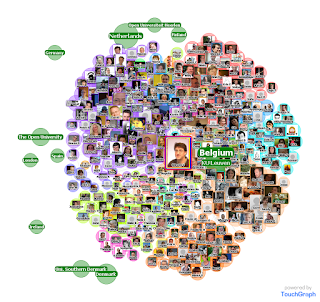
The online course on connectivism and connected knowledge (Edition 2009) started again this week. I participated last year, but mainly as a mega-lurker due to an overload of other projects. This year, I intend to participate more actively, hence this post.
Last year's short introduction gave me a bit of a feel for connectivism as a learning theory, and it got me thinking. How do learning theories relate to each other? Are they mutually exclusive or rather complementary? Last year, I developed a first thought about this, that goes along these lines (and extends the summary that George Siemens wrote for the course).
- Learning theories can be argued to be related to different stages in human life, and different learning theories are better suited for explaining learning at different stages / ages of learners. I prefer therefore to call them learning modes, rather than learning models or theories.
- Behaviorism can be applied to the way very young children learn, when neural connections in the brain are just being formed. Learning takes place in situations like: "When I cry long enough, Mommy feeds me", "When I smile at this nice man, he cuddles me". Stimulus-response based learning can be argued to apply mainly to more basic levels of skills and knowledge that can be subdivided into small chunks in a logical and structured way. As such, the behaviourist approach can be argued to lay the groundworks of knowledge and skills in humans.
- Cognitivism assumes that knowledge schemas already exist in a human mind, and then focuses on how new information and knowledge is added to the existing (neural) network of knowledge. Focus is on the individual learner, and his or her knowledge creation, storage and retrieval. It can be argued that this learning mode starts at primary school level, when children learn to connect 'loose items' of information into more complex schemas, and begin to see how things are connected. Cognitivism's focus on the individual coincides with the child's attention being focussed on itself and its immediate surroundings, its core family.
- When children start to become aware of context and social surroundings - often sometime around puberty- it can be argued that constructivism 'kicks in'. The unshakeable thruths that they learned in primary school tend to be no longer unshakeable. Their general knowledge is being remixed and rewritten into a personal and social version of that knowledge. Information is now co-constructed, and no longer taken at face value. The social surroundings play a major role in this phase of life.
- However, when students leave school / college / university, their existing social network gets distributed, and they need to enter a professional world, where they - more often than not - become (semi-) isolated experts in their field, who are required to put their acquired knowledge to good use, and monetise that knowledge. When they want to keep acquiring and growing their knowledge, they can enter their connectivist mode, and hook up with their extended online social network.
- The previous is not to say that one learning mode pertains to only one stage in life, but it indicates the dominant learning mode at that stage. There is also a sort of chrono-logical order in the learning modes. Each new learning mode somehow presupposes and builds on the previous mode.
- I think it's worth to further explore these learning modes and see if they apply to different types of information, skills, knowledge, or competencies. It might well be the case that learning simple and medium-complex skills is best tackled in behaviourist mode, whereas complex mathematical models are best learned in cognitivist mode.